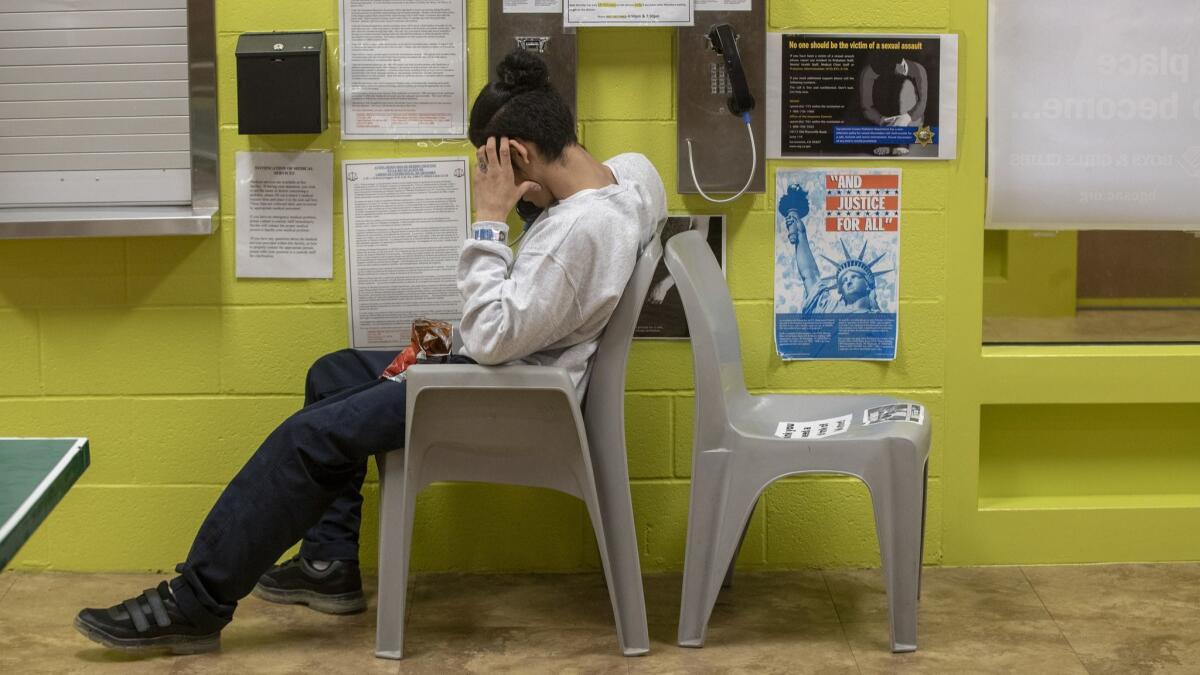Editorial: Pepper spray has no place in L.A. County’s juvenile halls and camps

- Share via
Pepper spray is excruciatingly painful, according to firsthand reports by many former L.A. County juvenile hall and probation camp inmates, and inflicts its torture on contact with the skin and especially the eyes, nose and mouth. As used by the staff, it causes a burning pain that continues as its victims are detained, away from the working sinks and showers that are needed to “decontaminate,” or wash the chemicals off. And the pain returns at night, the youths say, as chemicals absorbed by the skin are sweated out and burn all over again.
Pepper spray — or, more formally, oleoresin capsicum — is the Probation Department’s last-resort response to fights or other violence at several of the county’s facilities. Protocols require a host of de-escalation measures before resorting to the spray.
But a report presented Tuesday to the Board of Supervisors notes that in numerous instances, probation staff pepper-sprayed juveniles who posed no threat of violence. Some staffers violated policy by spraying youth who were taking prescribed psychotropic medication. Staff are required to issue warnings before using the spray, yet the report notes that some simply make blanket warnings as they begin each shift, leaving the juveniles in their care constantly anxious because they don’t know what behavior might trigger a spray attack. Some staff have taken to shaking their spray cans merely to intimidate youths. According to reports from some youth in the halls and camps, officers have on occasion set off their spray cans accidentally.
California is one of only a handful of states that permit the use of pepper spray in juvenile facilities. In this state, some counties ban its use. In others, it’s available but seldom deployed. In Los Angeles, however, use has more than doubled in the last several years.
A report presented Tuesday notes that in numerous instances, probation staff pepper-sprayed juveniles who posed no threat of violence.
The purpose of juvenile probation is explicitly rehabilitation rather than punishment, and although inmates in halls and camps are accused of serious offenses or have been “convicted,” (although that term properly applies only to adult criminal proceedings), the fact remains that legally, emotionally and developmentally, they are children. The vast majority of them have been victims of some kind of trauma or physical abuse, most often at the hands of adults.
Over many years, L.A. County leaders have responded to allegations of excessive force in their halls and camps, so it wasn’t for the first time that the Board of Supervisors on Tuesday heard reports of force that in any other context would be considered child abuse. Or, as some former inmates insist, torture.
Excessive force is a symptom — a serious, costly and potentially deadly symptom, but still a symptom — of a department that for decades now has been understaffed, under-resourced, often poorly managed and poorly overseen. Eliminating pepper spray as a tool would not by itself eliminate excessive force.
Yet it would at least eliminate a particularly pernicious and often wrongfully used weapon, and pending more widespread department reforms, that’s a necessary step. Given that the department has been unable to limit the misuse of spray in L.A. County halls and camps, the Board of Supervisors should ban it, just as it banned solitary confinement.
One essential way to curb the necessity of force in camps is to ensure that the right people — juveniles and staff alike — are there. Many juveniles who are acting out are in desperate need not just of trauma-informed care, but of mental health treatment. Supervisor Mark-Ridley-Thomas’ call for a serious assessment of mental health needs in juvenile facilities is right on point. But many should be in community-based mental health care rather than in camps at all.
Enter the Fray: First takes on the news of the minute »
As for staff, they are correct when they argue that they have been subject to shifting policies, often without proper retraining. Most can probably bring themselves up to date if they get the support they need from their department. But there are some who probably shouldn’t be there.
There is an argument to be made for the proper use of pepper spray in especially dangerous situations — for example, to protect a child from serious physical attack by other juveniles.
But there have been no verified studies in California evaluating the costs and benefits of using spray. For the present, there have been too many instances of improper use in L.A. County and too little use of well-tested de-escalation techniques that inflict less physical and psychic damage. Pepper spray should have no place in juvenile halls and camps.
Follow the Opinion section on Twitter @latimesopinion and Facebook.
More to Read
A cure for the common opinion
Get thought-provoking perspectives with our weekly newsletter.
You may occasionally receive promotional content from the Los Angeles Times.









